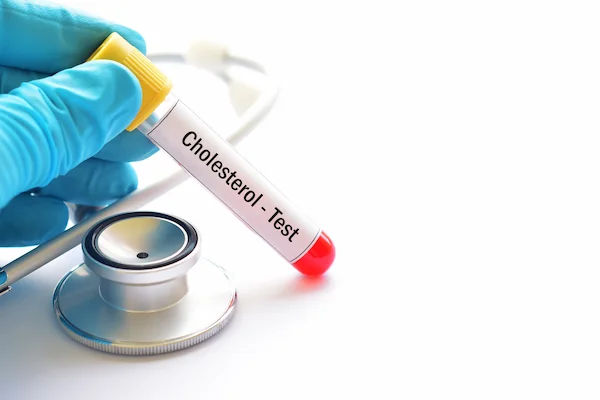Cholesterol Test: Fast or Not?
Know the cholesterol test pre-requisites. What is it? How to prepare for the test, interpretation of the test results, and how to improve the cholesterol levels


Introduction
Cholesterol tests are essential for understanding your heart health and identifying potential risks early. However, one common question many people have is: Should I fast before a cholesterol test? The answer isn’t always straightforward, and it depends on the type of test your doctor recommends.
In this article, we’ll explain what cholesterol tests are, why they matter, whether fasting is necessary, and how you can prepare for accurate results.
What is a Cholesterol Test?
A cholesterol test, also called a lipid panel or lipid profile, measures the levels of different fats in your blood, including:
- Total cholesterol – The overall amount of cholesterol in your blood.
- LDL (low-density lipoprotein) cholesterol – Often called "bad" cholesterol because high levels can lead to plaque buildup in arteries.
- HDL (high-density lipoprotein) cholesterol – Known as "good" cholesterol because it helps remove LDL from the bloodstream.
- Triglycerides – A type of fat that stores excess energy from food. High levels can increase heart disease risk.
These tests help doctors assess your risk of heart disease, stroke, and other cardiovascular problems.
Do You Need to Fast Before a Cholesterol Test?
Traditionally, doctors recommended fasting for 9 to 12 hours before a cholesterol test to get the most accurate results, especially for triglycerides. However, recent studies suggest that for many people, non-fasting tests can be just as reliable.
When Fasting is Needed:
- If your doctor specifically asks for a fasting lipid panel.
- If you have a history of high triglycerides or other metabolic conditions.
- If you’re being monitored for heart disease risk, and need precise LDL measurements.
When Fasting May Not Be Necessary:
- For routine screenings in healthy individuals.
- If your doctor uses a non-fasting lipid test (some modern methods adjust for food intake).
- If you’re only checking HDL (good cholesterol), which isn’t significantly affected by food.
Always follow your doctor’s instructions—if they recommend fasting, stick to water only before the test.
Consult a Top general practitioner for the best advice
How to Prepare for a Cholesterol Test?
Whether you need to fast or not, here are some general tips to ensure accurate results:
- Follow Fasting Instructions (If Required):
No food or drinks (except water) for 9–12 hours before the test.
Avoid alcohol for at least 24 hours before testing. - Stay Hydrated:
Drink water to make blood drawing easier. - Avoid Heavy Meals the Night Before:
Even if not fasting, a fatty meal can temporarily raise triglyceride levels. - Inform Your Doctor About Medications:
Some drugs (like statins, birth control, or steroids) can affect cholesterol levels. - Stay Relaxed
Stress can influence cholesterol, so try to stay calm before the test.
What Do Your Cholesterol Numbers Mean?
After your test, your doctor will explain your results. Here’s a general guideline:
Higher LDL and triglycerides increase heart disease risk, while higher HDL is protective.
How to Improve Your Cholesterol Levels?
If your test shows high cholesterol, don’t worry—many lifestyle changes can help:
Dietary Changes:
Follow the below dietary changes:
- Reduce saturated fats (found in red meat, butter, fried foods).
- Increase fibre (oats, beans, fruits, and vegetables).
- Choose healthy fats (avocados, nuts, olive oil, fatty fish like salmon).
- Limit sugar and refined carbs (sweets, white bread, soda).
Exercise Regularly:
- Aim for 30 minutes of moderate activity (walking, cycling, swimming) most days.
Maintain a Healthy Weight:
- Losing even 5–10% of body weight can improve cholesterol.
Quit Smoking & Limit Alcohol:
- Smoking lowers HDL, while excessive alcohol raises triglycerides.
Medications (If Needed):
- If lifestyle changes aren’t enough, your doctor may prescribe statins or other cholesterol-lowering drugs.
When Should You Get Tested?
Different age groups to be tested as:
- Adults (20+ years): Get tested every 4–6 years if at low risk.
- High-risk individuals (diabetes, obesity, family history): Test more frequently as advised.
- Children & Teens: May need testing if there’s a family history of high cholesterol.
Final Thoughts
Cholesterol tests are a simple yet powerful way to monitor your heart health. Whether you need to fast or not depends on your doctor’s advice, so always confirm before your test. If your levels are high, small lifestyle changes can make a big difference.
Consult a Top general practitioner for the best advice
Consult a Top general practitioner for the best advice

Dr. Syed Ismail Ali
General Practitioner
7 Years • MBBS
Hyderabad
Apollo 24|7 Clinic, Hyderabad

Dr. M L Ezhilarasan
General Practitioner
6 Years • MBBS
Visakhapatnam
Apollo 24|7 Clinic - Andhra Pradesh, Visakhapatnam

Dr D M Karthik
General Practitioner
4 Years • MBBS, Fellowship in Diabetes Mellitus, Advance certificate in Diabetes Mellitus, Derma Nutrition Certification
Visakhapatnam
Apollo 24|7 Clinic - Andhra Pradesh, Visakhapatnam
Dr. Uma Bharathi
General Practitioner
6 Years • MBBS
Chokkikulam
TVS LAKSHMI HOSPITAL, Chokkikulam
Dr. Karanam Kondalamma
General Practitioner
4 Years • MBBS
Hyderabad
KK Clinic, Hyderabad
Consult a Top general practitioner for the best advice

Dr. Syed Ismail Ali
General Practitioner
7 Years • MBBS
Hyderabad
Apollo 24|7 Clinic, Hyderabad

Dr. M L Ezhilarasan
General Practitioner
6 Years • MBBS
Visakhapatnam
Apollo 24|7 Clinic - Andhra Pradesh, Visakhapatnam

Dr D M Karthik
General Practitioner
4 Years • MBBS, Fellowship in Diabetes Mellitus, Advance certificate in Diabetes Mellitus, Derma Nutrition Certification
Visakhapatnam
Apollo 24|7 Clinic - Andhra Pradesh, Visakhapatnam
Dr. Uma Bharathi
General Practitioner
6 Years • MBBS
Chokkikulam
TVS LAKSHMI HOSPITAL, Chokkikulam
Dr. Karanam Kondalamma
General Practitioner
4 Years • MBBS
Hyderabad
KK Clinic, Hyderabad




.webp)